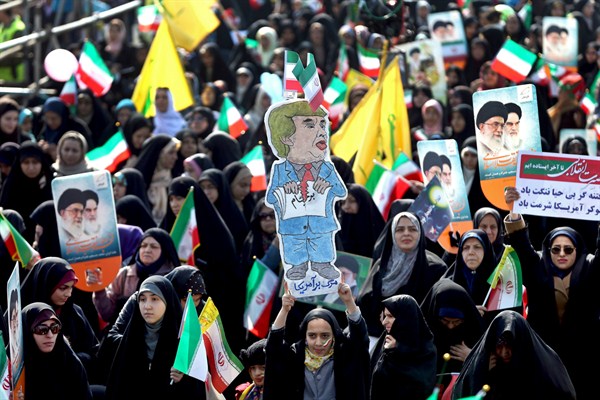The nuclear deal between Iran and six world powers has been polarizing since the day it was signed in 2015, both in Iran and the United States. Even so, Tehran has complied with the deal’s terms while continuing to support it, even as President Donald Trump, a loud critic, has pledged to withdraw the U.S. from the agreement. Ahead of a May 12 deadline for Trump to decide whether to stay in the deal, we’ve compiled 10 articles assessing its impact on Iran and the broader implications of Trump’s mission to terminate it.
The following 10 articles are free for nonsubscribers until May 17.
Iran Stays the Course
How the Nuclear Deal Has Reconfigured Iran’s Political Landscape
Traditionally, Iran’s political sphere was divided into three competing ideologies: pragmatists, reformists and hard-liners. But Saeid Golkar writes that since the election of President Hassan Rouhani in 2013 and the 2015 nuclear deal, these groups have been reconfigured into two camps—reformist “interactionists” and hard-line “conflictualists”—that endorse opposing strategies for solving Iran’s political and socio-economic problems.
Iran believed the nuclear deal would usher in an era of badly needed foreign investment. So far, that hasn’t quite been the case. In an email interview last August, Sanam Vakil described Iran’s economic progress since international sanctions were lifted and how its domestic and foreign policies have been affected.
The wisdom of linking recertification of the nuclear deal to Tehran’s ballistic missile program is debatable, Shahryar Pasandideh wrote last November. But a series of tests last year nevertheless demonstrated that Iran is continuing to make significant progress toward achieving its missile and space ambitions. If successful, Iran could launch military satellites and field a more capable arsenal.
Iran’s purchase of 20 passenger planes from the French firm ATR last year was part of a large-scale effort by Tehran to upgrade its commercial air fleet. In an email interview last June, Bijan Khajehpour described the needs of Iran’s aviation sector and the lingering obstacles to meeting them.
Protests that took place across Iran in late 2017 and early 2018 captured the world’s attention and brought renewed scrutiny to the popular legitimacy of Ayatollah Ali Khamenei’s regime. Ellen Laipson wrote at the time about the long-term foreign policy consequences—in Washington as well as in Tehran.
Trump Weighs His Options
One of the Trump administration’s early salvos against the nuclear deal came last June when the U.S. Senate passed a bill imposing new sanctions against Iran and Russia. Ellen Laipson explained at the time that while the bill wouldn’t derail the agreement all on its own, it pointed to broader threats to the pact’s durability under Trump.
The Trump administration should take heed of the economic pitfalls associated with its showdown with Iran over the nuclear deal, Neil Bhatiya warned last August. The U.S. must be prepared to go it alone, because Iran will fight a snapback of sanctions and can rely on its European and Asian oil customers to back it up.
The protests that erupted in Iran in late December created a pretext for the Trump administration to renege on the nuclear deal. Yet new U.S. sanctions would have inflicted only minor economic pain on Tehran, Neil Bhatiya and Edoardo Saravalle wrote in January, while undermining the very protesters the administration was vocally supporting.
Anyone who expects a definitive outcome for the Iran nuclear deal on May 12 may well be disappointed, Judah Grunstein argued last month. The deal seems perfectly designed to serve as a prop in the collective psychodrama that U.S. foreign policy has become under President Trump; instead of a cataclysm, the looming deadline could well lead to more of the same muddle.
Global attention is currently focused on Iran and North Korea as the nuclear deal deadline approaches and Washington and Pyongyang prepare for a landmark summit. Last week, Ellen Laipson examined two ways these crises are related; the first being familiar, and the second often neglected.

